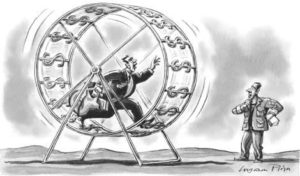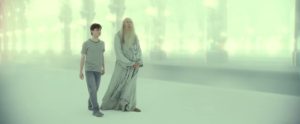One of my Christmas gifts to my wife was a cookbook on making bread written by Paul Hollywood, one of the judges on the much-loved Great British Baking Show. When I put a picture of the book’s cover on Facebook along with a picture of my wife’s first and fantastic looking loaf, a couple people wryly commented, “I see what you did there!” In other words, buy your wife a cookbook and you get to savor the benefits!
Looking at today’s Scripture selection from the Revised Common Lectionary may evoke a similar reaction, albeit in a different vein. Because one glance at Psalm 36 and we can all say to the Lectionary folks, “We see what you did there!” They carved out a lyric text about God’s goodness from the surrounding context that deals with evil and wicked and proud people and how conniving they are and how in the end they will lay fallen on the ground, undone by God and by God’s swift justice.
But no, no, the Lectionary seems to say, let us not look at all that.
We see what you did there. And it won’t do.
Because the psalmist here is drawing a contrast. There is tragedy to be observed here: the middle part of the poem is what the wicked miss out on due to the insularity of their sinful ways. Those who do not love God, believe in God, or honor God in any way miss out on the deep beauty of the cosmos. They are too busy flattering themselves with the lies they tell to themselves that leave them sinless in their own eyes. They are too busy feathering their own nests by any means possible to worry whether there even is such a thing as right or wrong in the universe. They are not only sinful but unwise, they are fools. And as the old adage has it: fools are often in error but never in doubt.
Even when they lie on their beds—when they could be engaged in prayer or praise of God, when they could be pondering what a wonderful world they get to inhabit—they are scheming for the next day. They never really quite get to rest, and maybe that is part of the point. When you think you are inventing your own life (and rules) as you go along, you can never stop. When you think the whole world needs to be tailor-made to be convenient and of great benefit to yourself, you never dare let up even for a moment.

The wicked know no Sabbath. They cannot rest. And so by the end of the psalm it is no wonder to see that they have fallen into an exhausted and finally futile heap. They cannot rise—and no God is going to help them rise—because at the end of the day, they have expended and exhausted themselves in a vain attempt to make a name for themselves. To make a living for themselves. To make a life for themselves. But as too many in also today’s rat race discover: when you are working 80 hours a week to make a life for yourself you may find out that you don’t have time to live life. In making a life, you end up having no life.
We really do need to look at those opening and closing verses to appreciate all this as well as to understand what the poet is getting at in the middle part. Because when as a believer in Yahweh the psalmist steps back, he sees that the love and beauty and power of God envelope us. God’s love is the sky above. God’s justice is the great deeps of the earth. And in between those heights and those depths it is under the shadow of God’s wings that we take refuge. We REST. We experience Sabbath. The sun does not need our help to come up again tomorrow. We do not need to re-invent the world anew each day. We do not need to make a life for ourselves because God himself IS our life and from his richness we eat and we drink and we feast at a banquet table of shalom, of love, of grace.
“With you is the fountain of life” the psalmist sings, “and in your light we see light.” This reminds me of the great line from C.S. Lewis when he said in effect “I believe in God for the same reason I believe in the sun that shines up in the sky. I believe not just because I can see the sun but because BY the sun I can see everything else.” God is the bright center of the cosmos and of all human existence. And so it makes sense that God is the floodlight, the shining sun, the Light that doesn’t even need a proximate source in order to shine (remember in Genesis 1: God created light BEFORE any sun, moon, or stars): because of all this God illumines everything else.
Our families, our relationships, what we do for a living and the gifts we utilize to do our work well: God lights up all of it so we can both see and understand all these good things in the proper context. The creation, the animals and other creatures with whom we share this world, the beauty we experience in creation: it all makes proper sense only when we understand God as the Creator but also as the foundation of it all.
The shame and the pity of it all is that the wicked miss out on so much. We really ought not to hate those who do not or cannot believe in God: pity and compassion are the better responses. They are missing out on so much. They are working themselves to a frazzle in pursuit of a peace, a life, a contentment they will never find through living that way. Yes, it may be that the Psalms don’t always evince such loving pity or concern, and maybe the sometimes-harsh rhetoric of the ancient Hebrew poets is what makes the RCL shy away from certain portions of these poems. But really, we need to see the whole picture—and now see it all in the light of the Savior of all grace, Jesus himself—in order to frame up both our lives and their lives in the right way.
Of course, the rest of the world works overtime to convince us otherwise. It is buttoned-down moral Christians and the like who miss out on life’s pleasures. The Puritans were once caricatured as being people whose greatest fear is that somewhere in the world someone is having fun. That may have been unfair but what is patently obvious from Hollywood to Wall Street to the fashion and advertising industries is that the “good life,” the “high life,” the gusto and the brass ring will never be achieved by Christians or other people of serious faith and conviction. To get at all those goodies you have to work hard, party hard, get the needed funds, buy the necessary trappings of success.
It’s all a lie, and a lie that exacts a terrible price at that. If people are supposed to be so happy and carefree these days, then what accounts for a heroin and opioid crisis that almost defies description? Why do people need to numb themselves to all pain first with prescription medication and then with illegal drugs that perpetuate the buzz? Although there may be a myriad of reasons behind something like the opioid crisis—which may have faded from the headlines due to the COVID pandemic but it is still here and may even have gotten worse in the time of COVID—a sense of malaise is surely among the leading causes for such self-medicating.
Our prayer should be that all people—even the wicked and the lost otherwise pitied if not derided by some of the verses of Psalm 36—can come instead to be sated at the table of the Most High God. His is a banquet of love and grace and in his light, we finally really do see the Light of the World.
Illustration Idea
In the books and films of the “Harry Potter” series, from the beginning there is a dark figure lurking in the background. Mostly in the series he is referred to only obliquely as “He Who Shall Not Be Named.” We discover early that this dark lord was once a boy named Tom Riddle. But in later years he was known by a name so dreaded as to make people afraid to take it upon their lips: Voldemort. We find out soon enough he is the one who gave Harry his signature lightning bolt scar on his forehead. And eventually we find out that scar was given on the night Voldemort murdered both of Harry’s parents when Harry was just a baby.
Eventually Harry and Voldemort meet and begin a long series of battles that will eventually lead to Voldemort’s demise. But as Harry gets to know the former Tom Riddle, he finds he does not hate him. He pities him. He pities Voldemort that he will never know friendship. He will never know love. He will never know beauty.

In a dream sequence (or is it real?) just before Harry faces down Voldemort for the last time, Harry has a conversation with his now-dead former schoolmaster, Professor Dumbledore. Harry is sad Dumbledore died as part of the larger battle against Voldemort and his minions but before Dumbledore exits Harry’s dream, he says “Do not pity the dead, Harry. Pity the living. And above all, pity those who live without love.”
That kind of pity for the loveless, for the self-absorbed proud of the earth is pretty much what Psalm 36 evinces as well. How much better to live in fellowship with the God in whose light alone we can see light.
Sign Up for Our Newsletter!
Insights on preaching and sermon ideas, straight to your inbox. Delivered Weekly!
Sermon Commentary for Sunday, January 16, 2022
Psalm 36:5-10 Commentary